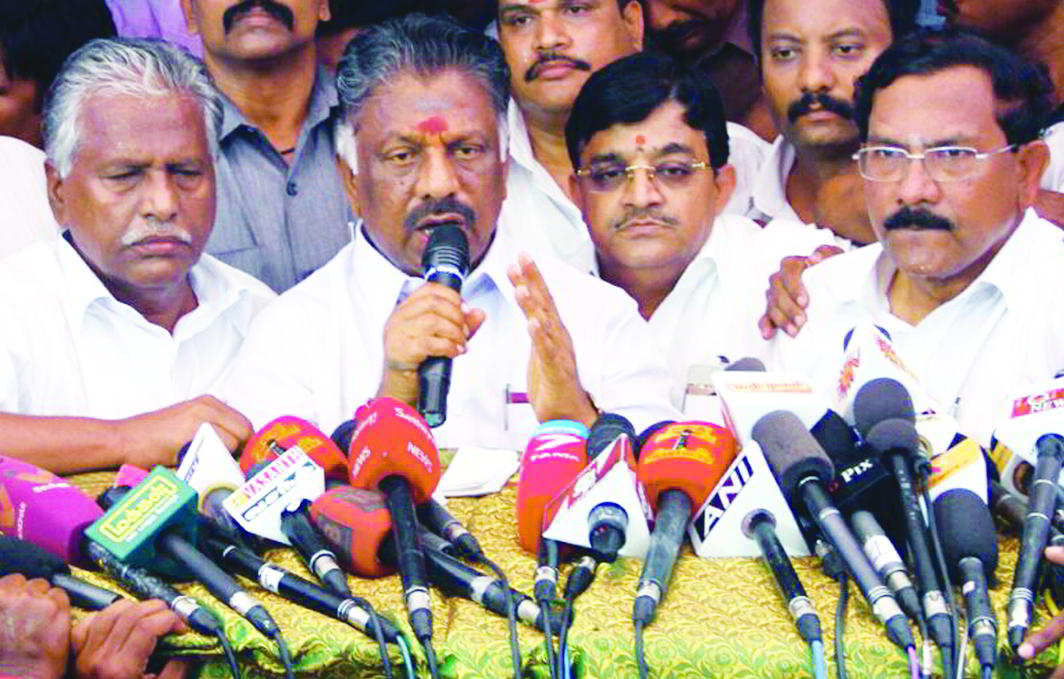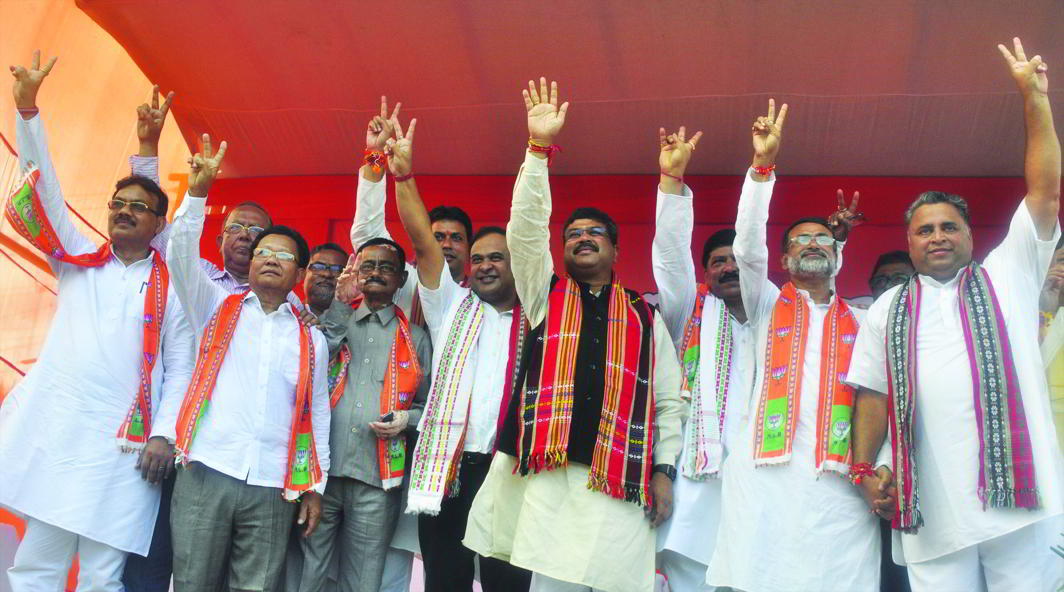Above: Citizens vote in the 2014 general election. Photo: UNI
Is it constitutionally valid for one partner of a coalition, may be the dominant partner, to ally with a party in opposition after breaking up the coalition and forming a new government?
~By PDT Achary
With the gradual disappearance of one-party domination or single-party majority in India’s legislatures (2014 election results are an exception), a coalition of political parties has become a credible arrangement to win elections. A pre-poll coalition is the most common form of this arrangement. Political parties bind themselves to a common minimum programme which is presented before the electorate and seek their support. It is obvious that when a particular pre-poll coalition is voted to power, the people vote not for any one party or leader. Their vote is for the coalition as a whole.
So what happens when such a coalition breaks up and the government falls? Can any of the coalition parties join hands with a party in the opposition and form another government? Political parties are all in favour of such arrangements because they keep an immediate election at bay. The most dreaded thing in the life of an elected MLA or MP is an untimely election. So there is a fair measure of agreement among political parties to avoid elections as long as possible. Hence their eagerness to form a new government when a coalition breaks up.
BREAKING COALITIONS
It must be said in this context that a coalition breaking up is not a result of any basic ideological difference among the partners. Far from it. Indian politics was never an ideology driven activity. Politics is practised to gain power, which normally keeps the coalition from breaking up. But when one of the partners finds better prospects elsewhere and leaves, the coalition breaks up and the government falls. But a government will be in office with a new partner very soon. No one has ever asked as to what happens to the original mandate the people gave to one coalition. Is it constitutionally valid for one partner (may be the dominant partner) to tie up with a party in opposition after breaking up the coalition and then form a new government?

This questions assumes importance not only because of the unethical conduct of a coalition partner in breaking the coalition, but also because of the clear negation of the original mandate given to the coalition by the people. Can the mandate of the people, once obtained, be ignored and are coalition partners free to join hands with any party to form alternative governments?
The constitution or the Representation of the People Act, 1951, does not address this issue directly. But it is clear to all that it is the mandate of the people which sustains representative governments. If a party which has won the election cracks up into warring groups later, it loses the mandate to rule because the people had given the mandate to that party as a whole. What happened to the AIADMK in the aftermath of Jayalalithaa’s death is a case in point. Notwithstanding the hasty disqualification of 18 MLAs by the Speaker, which created a temporary majority for the government, the fact is that the original mandate of the people in favour of that party no longer survived. The only legitimate course in such a situation is to seek a fresh mandate.
Now let us test this proposition. When a coalition of parties running a government breaks up during its tenure and one of the partners joins hands with a party in the opposition and forms another government, it loses the original mandate and hence becomes illegitimate. What is then the mandate of the new government? The party in opposition has no mandate to rule. Similarly, one partner in the erstwhile coalition has no mandate to form a government with the help of the party in opposition. So neither partner in the new coalition has a mandate to form the government.
BINDING MANDATE
The new partners, no doubt, cobble together a majority in the assembly. But such a majority is only a numerical one without the backing of the mandate of the people. It is sheer fallacy to think that after being elected, the members of the legislature can act in any manner they like. They do not have such unbridled freedom in a manner which negates the mandate of the electorate. The mandate binds them. This principle is laid down in the 10th Schedule of the constitution. Under Paragraph 2(2) of the Schedule, a person elected as an independent is disqualified if he joins a political party after such election. The underlying idea is that if an elected member acts against the mandate, he will suffer the consequences.
The entire anti-defection law is designed to establish the principle that legislators elected by the people are required to adhere to the original mandate. The same principle applies to the coalition of parties, too. What is sauce for the goose is sauce for the gander. It can, therefore, be safely stated that the whole exercise in ministry-making by one of the partners in collaboration with the party in opposition has no constitutional legitimacy.
The argument by the politicians that it is their duty to provide a government to the people and going back to them should be the last alternative is only self-serving and has no constitutional backing. Sovereignty resides in the people and it is only proper to seek a fresh mandate from the sovereign when the old mandate is exhausted.

ILLEGAL CIRCUMVENTION
Politicians are generally averse to rules and regulations which constrain them, and often circumvent such inconvenient boundaries. Take the case of the anti-defection law. This law constrains legislators from party hopping. But the ingenuity of Indian politicians knows no bounds. They often find a way to get round anti-defection rules. These days, legislators defect in large numbers. In Arunachal Pradesh, for example, the entire legislature wing of a political party defected to another party. Similarly in Tripura, most of the members of the legislature wing of the Trinamool Congress joined the BJP. They did so under the mistaken belief that they are protected because instead of two-thirds of the members, the entire legislature party walked over to the other party.
These parties have erred grievously by switching their loyalty en masse. Paragraph 4 of the 10th Schedule gives protection to the defecting members only on the fulfillment of two conditions. One, the original political party should decide to merge with another party; two, as a part of this decision, two thirds of the legislators merge with another party. It is not enough for two-thirds of the legislators to merely merge with another party; the original political party should also merge with it. If this does not happen, there is no merger under Para 4 of the 10th Schedule and all the defecting legislators are liable to be disqualified.
The law on this point was clarified by the Supreme Court in two cases—Rajender Singh Rana v Swamy Prasad Maurya (2007) and Jagjit Singh v State of Haryana (2006). These two decisions of the apex court would not give much comfort to either the defected legislators or the potential defectors. The mandate of the law is being defeated at present by the Speaker not deciding the petition during the entire term of the assembly. It is being experimented rather successfully in at least some assemblies. But, hopefully, this phase, too, will come to an end when the constitution bench of the Supreme Court finally fixes a time-limit within which to decide all cases of defection.
—The writer is a former secretary
general of the Lok Sabha


